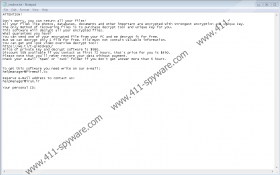Alka Ransomware Removal Guide
Alka Ransomware is an annoying computer infection that will not let you live. This program slithers into your system and then encrypts your personal files. You can probably tell what happens next: this program expects you to pay a ransom fee for the decryption tool that should unlock your data. Nevertheless, you should never pay anything to these criminals. Follow the manual removal instructions at the bottom of this description to remove Alka Ransomware for good. If you need help with that, do not hesitate to invest in a licensed security application.
In a sense, we know exactly what we should expect from Alka Ransomware because this is definitely not a stand-alone infection. It comes from the STOP Ransomware family, and these infections are quite well-known in the cybersecurity world. It also means that Alka Ransomware works pretty much like Gesd Ransomware, Leto Ransomware, Odveta Ransomware, and many other applications from the same group.
The interesting part of these infections is that you can decrypt the data affected by the STOP Ransomware programs, provided those programs use the offline key to encrypt your data. There is a public decryption tool available for the offline encryption key. On the other hand, if Alka Ransomware uses an online key to encrypt data, file recovery becomes tricky.
The easiest way to retrieve your files is clearly through a file backup. That means you can delete the encrypted files from your system, remove Alka Ransomware, and then transfer the healthy files from an external hard drive or a cloud drive back into your computer. Of course, it means that you have to regularly save copies of your data someplace else. And not everyone does that. So, not everyone can easily retrieve their files from a backup.
Even if you were infected with Alka Ransomware, you should also pay attention to the ransomware infection prevention, because there is a very good chance that such programs will enter your system again. So, Alka Ransomware and all the other similar apps usually employ spam email attachments to spread around. So, those files that you receive from unknown senders may often be ransomware installer files. Even if they look legitimate, they might still carry dangerous codes that, once launched, download and install Alka Ransomware on the victim’s computer. How to know whether the file is safe or not? You can scan all the downloaded files with a security tool of your choice before you open them.
Obviously, a lot of users fail to do that, and so they get infected with Alka Ransomware. After the infection takes place, this program encrypts the victim’s files and then displays the following ransom note:
ATTENTION!
Don’t worry, you can return all your files!
All your files like photos, databases, documents and other important are encrypted with strongest encryption and unique key.
The only method of recovering files is to purchase decrypt tool and unique key for you.
<…>
Price of private key and decrypt software is $980.
Discount 50% available if you contact us first 72 hours, that’s price for you is $490.
Of course, there is no need to pay this ransom fee because it is very unlikely that these people would issue the decryption key in the first place. You have to remove Alka Ransomware from your system today, and then look for alternative ways to restore your files.
As mentioned, the most convenient way to restore your files is to transfer them back to your system from an external backup. Yet, if you do not have one, do not hesitate to address a professional who will help you go through other file recovery options.
How to Remove Alka Ransomware
- Delete the most recent files from Desktop.
- Delete the most recent files from the Downloads folder.
- Press Win+R ant the Run prompt will open. Type Regedit and click OK.
- Open HKEY_CURRENT_USER\Software\Microsoft\Windows\CurrentVersion\Run.
- On the right pane, right-click and remove the value with the following file format: 0x0xx000-00x0-000x-0x00-0x00xx0x0xx0
- Press Win+R again and access these directories:
%UserProfile%\Local Settings\Application
%LocalAppData% - Delete the folder with the 0x0xx000-00x0-000x-0x00-0x00xx0x0xx0 format from both directories.
- Press Win+R again and type %WinDir%. Press OK.
- Access System32/Tasks and remove Time Trigger Task.
- Scan your computer with SpyHunter.
Alka Ransomware Screenshots:


